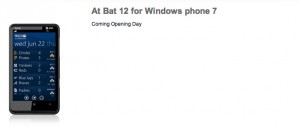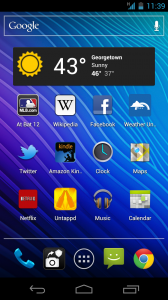Announced in October and first sold in the US in December, this review of the Galaxy Nexus is late, even by my standards. But it took me longer than expected to get one, because AT&T still hasn’t offered it and I’m averse to spending north of $600 on a device whose shelf life is maybe two years and which is more likely to be lost, broken or stolen than a laptop. Switching to Verizon to get one wasn’t an option because they have no coverage on the island I currently live on: for better or for worse, I’m stuck with AT&T. And frankly, I’d prefer to have a GSM version of the phone; I don’t travel internationally a lot, but it happens enough that a CDMA handset would be suboptimal.
Eventually, I worked out an upgrade path. Purchase a Galaxy Nexus, then renew my contract with AT&T using my upgrade to get a subsidized Galaxy Note, which when sold on Craigslist or eBay should more than offset my cost for the Nexus. The net for the Nexus then, is my AT&T upgrade price: a far more palatable sum than $600+. Having used the phone for a week or so, here are my thoughts. In Q&A style, naturally.
Q: Why a New Phone?
A: I never loved my previous phone, a Nexus One, the way that I understand that Hilary Mason did. But it was – is still, in fact – a fine phone, if one showing its age. It was limited to 3G, but that wasn’t enough of an issue for me to upgrade. Instead, my primary issue with the phone was storage space. Unlike the Galaxy Nexus, the Nexus One allowed you to upgrade the onboard MicroSD card, so that you could expand – dramatically – the amount of available storage. But pre-Honeycomb versions of Android distinguished between internal and external storage. Later improvements allowed applications to be moved to the larger external storage card, but many – like Twitter – did not. With only 190 MB of available application storage, then, things got crowded. Crowded enough that by the end, when I wanted to install one application I had to pick another to uninstall. Which isn’t handy if part of your job is evaluating mobile applications. So a new phone was in the cards sooner or later.
Q: Why the Nexus?
A: First, because Android fits my needs better. Second, because I advantage Nexus devices.
Q: Taking those in order then, why Android?
A: A few reasons. First, most of my services usage is Google centric. I use Gmail, and we’re a Google Apps shop, my music collection currently lives in Google Music and so on. The integration of those services on Android is better than it is on competing platforms. Second, while I’ve been an iPhone user in the past, owning a first generation and then a 3GS and enjoying both, I prefer some of Android’s conventions, most notably the back button. Third, the competition. Apple still makes, in my opinion, the best devices, but their services don’t deliver the same experience. MobileMe was, by Apple’s own admission, a failure, and the early returns on iCloud and Apple’s second generation services are mixed. Which would be less of an issue if I wasn’t consuming these at an accelerating rate, but more on that later. As for Windows Mobile, they’ve gotten a lot of positive press lately, and while it’s generally well earned, this is enough to make Windows Mobile a non-option for me.

I kid, but only sort of. As I’ve told reporters repeatedly, Microsoft’s biggest problem in mobile isn’t product, but time. They were very late to market, and the result is a vicious cycle of fewer apps equals fewer sales equals fewer incentives for application developers to create new applications. We’ll see what role Nokia can play in changing those fortunes; for now, Windows Mobile wasn’t an option for me, and not just because my @hotmail.com address is my spam address.
Q: Ok, so why the Nexus?
A: A few reasons.
- Google, while not Apple’s equal in software design and usability, is better at that than Samsung, HTC, Motorola and any of the other Android manufacturers. I have no more interest in what OEMs do to Android to differentiate themselves than I did in what Lenovo did to Windows. Features intended to differentiate are, you can be sure, not features put there solely for the user.
- The Nexus line comes with full, uncrippled functionality. While iPhone users, for example, are required to pay extra for the ability to tether their connection, I can do that out of the box. And before someone says to the above that I could always swap a carrier ROM for something custom, I get that. But the days when I had time to sift through the various phone ROMs and play with various combinations for pleasure are, in all likelihood, gone.
- Nexus devices are first inline for operating system updates; a not insignificant advantage given the well documented problems with Android version fragmentation.
- Nexus devices are unlocked, so when I’m in Europe I pop in a different SIM: no need to pay for unlock codes from sketchy vendors on eBay.
Q: The GSM Nexus is HSDPA only. Didn’t you want LTE?
A: I actually have LTE on my tablet – itself a Google Experience device, and it is every bit as impressive as people say it is. It’s one of the fastest connections I’ve used outside of universities, in fact. I consistently get 13-15 down in LTE services markets. HSDPA, by contrast, has clocked in at a little less than half of that; 4-6 down, though I haven’t tested it in a major market yet.
But you know what? That’s more than enough. Besides being faster than what I had, it’s actually 2-3X faster than my DSL connection at the home office. Which, yes, is an indictment of our internet speeds on island, but also confirmation that I don’t need to get too greedy. LTE for my handset would probably be overkill, in fact. And given the battery life issues with LTE at the moment – its extremely thirsty – I’m happy to trade a few extra download ticks I won’t notice on a handset for more usable device time.
Q: The other major complaint about the Galaxy Nexus is the size. News.com’s Stephen Shankland, for example, would “exchange some screen size for a secure one-handed grip.” Any issues with the size?
A: I don’t have Koufax-sized mitts, but the size has been a non-issue for me. Every so often there’s a dialog in the extreme upper corner of a screen, which requires a bit of a stretch, but in general I haven’t noticed it. Part of that is the weight.
Q: What about the weight?
A: The first thing that people – iPhone users in particular – notice about the phone when I hand it to them is the weight, or rather the lackthereof. It’s a mere 5 grams lighter than the iPhone 4S, but because it’s physically larger the difference between expectation and actual makes it seem even lighter than it is.
Q: How about the camera?
A: It’s no match for the iPhone’s, as I understand such things; 5 megapixels. It’s fine for my basic usage, but I’d recommend against the Nexus if the camera’s a priority for you.
Q: How’s Ice Cream Sandwich?
A: It’s got its rough edges here and there, but I’m a fan. The notifications remain good, the application tray metaphor is a big step up from Gingerbread, and lots of little things have been improved like access to Settings and the voice recognition UI (the latter being one of Android’s most underrated features, IMO). Something long overdue – the ability to take screenshots – has finally been added, as well. Personally, I don’t notice the lag or latency that iOS users point to – it feels quick to me – but your mileage may vary.
I still don’t think believe it to be the equal of iOS, but I like it.
Q: What about the storage size?
A: This has been one of the more interesting epiphanies I’ve had; after thinking about it, I got the 16GB model. It used to be that I obsessed over the on device storage, because I wanted to have the majority of my music, at least, with me as I did on the iPod it replaced. These days? I’ve got maybe a gigabyte’s worth of music on the device, to be employed on planes, at the gym or other places I can’t get bandwidth. Otherwise? Everything is streamed, and I’m not worried about maxing the device out. The obvious problem with this is bandwidth costs, as I’ve written about before. If everything is streaming, your data consumption adds up quickly. According to the phone, in the last week Google Music is the leading bandwidth consumer at 151 MB. But what happens when I start watching NetFlix when I’m on the road? Or MLB.tv?
When I asked Google’s Andy Rubin about this at I/O, he was unconcerned, saying that we were a step function away from this being a non-issue. The Verge’s Chris Ziegler would, presumably, be skeptical of this claim. It will be interesting to see who’s right.
Q: How about something you don’t like about the phone?
A: The battery cover is flimsy and difficult to remove, which will be a problem if (when) I get a second battery. The placement of the headset jack on the bottom of the phone is also inconvenient; if you want to listen to music at the gym with the phone on a treadmill or elliptical and use the Kindle app at the same time, you’ll be doing so in landscape.
Q: Speaking of, how is the battery life?
A: I’ll know more when I’ve traveled with it, but when I get up in the morning, an hour and a half’s heavy usage knocks it down to around 70-75% from a full charge. Which theoretically means that if I’m not on the device constantly, I should get a full day out of the device. Even so, I will probably still employ a two battery system, the device’s suboptimal battery cover notwithstanding.
Q: What’s the thing I should do first when I get a Nexus or another Ice Cream Sandwich handset?
A: Install Chrome for Android and replace the stock browser. It’s a vast improvement, and if you’re using experimental builds of Chrome on the desktop, you can even access their tabs.
Q: Tl;dr – thumbs up or down?
A: Thumbs up. This is the first phone I’ve really liked since my first iPhone. If you can find one, I recommend it.

Coco Page says:
April 30, 2012 at 11:27 am
I heard rumors and new about galaxy nexus and the feedback were great. I just don't hear them make publicity and show some exhibitions. A very hospitable reaction towards competition!
My SquareTrade Experience – sogrady.org says:
October 31, 2012 at 5:31 am
[…] aging Nexus One to its newer cousin, the Galaxy Nexus. In March of this year, I bought an unlocked Galaxy Nexus from Amazon, then used my AT&T subsidized upgrade to secure a Galaxy Note. For reasons I still […]